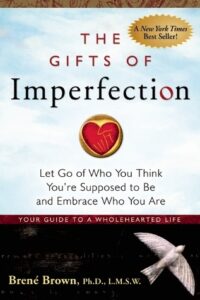
Brené Brown’s “The Gifts of Imperfection” delves deep into the realms of self-worth, vulnerability, and the pursuit of a wholehearted life. It’s a guide that encourages readers to shed the weight of societal expectations and embrace their authentic selves.
Core Themes
- Wholehearted Living: At its core, the book promotes a life lived with an inner sense of worthiness. It’s about believing “I am enough” amidst life’s challenges and triumphs.
- Vulnerability: Brown champions the idea that vulnerability is not a sign of weakness but a testament to our courage. It’s about fully accepting who we are and not concealing it from others.
- Self-compassion: Perfectionism, as Brown suggests, is a self-destructive belief. Instead, she urges readers to practice self-compassion, recognizing that everyone is made of both strength and struggle.
- Connection: Genuine connection arises when we feel understood. It’s not just about listening but also about reaching out, asking for help, and being there for others.
- Resilience: Resilient individuals are not just resourceful; they believe in their ability to cope, have supportive networks, and often possess a spiritual belief that connects them to a power greater than themselves.
Notable Insights
- Brown’s research emphasizes the importance of self-acceptance and the power of caring connections where we can share our stories of struggle.
- The book lists ten guideposts for Wholehearted Living, which include being authentic, practicing self-compassion, building resilience, and expressing creativity, among others.
- Brown’s perspective on love is profound. She believes that one can only truly love others if they first love themselves. This love is cultivated when we allow our vulnerable selves to be seen and accepted.
- The book also touches upon the pitfalls of perfectionism, highlighting that it’s not about self-improvement but rather a quest for external acceptance.
I also recommend you watch her hugely popular TED Talk or visit the author’s website:
Quotes From The Book
“We cultivate love when we allow our most vulnerable and powerful selves to be deeply seen and known, and when we honor the spiritual connection that grows from that offering with trust, respect, kindness, and affection. Love is not something we give or get; it is something that we nurture and grow, a connection that can only be cultivated between two people when it exists within each one of them – we can only love others as much as we love ourselves. Shame, blame, disrespect, betrayal, and the withholding of affection damage the roots from which love grows. Love can only survive these injuries if they are acknowledged, healed and rare.”
“Authenticity is a collection of choices that we have to make every day. It’s about the choice to show up and be real. The choice to be honest. The choice to let our true selves be seen.”
“We cannot selectively numb emotions, when we numb the painful emotions, we also numb the positive emotions.”
“The dark does not destroy the light; it defines it. It’s our fear of the dark that casts our joy into the shadows.”
“Understanding the difference between healthy striving and perfectionism is critical to laying down the shield and picking up your life. Research shows that perfectionism hampers success. In fact, it’s often the path to depression, anxiety, addiction, and life paralysis.”
“Faith is a place of mystery, where we find the courage to believe in what we cannot see and the strength to let go of our fear of uncertainty.”
“Perfectionism is a self-destructive and addictive belief system that fuels this primary thought: If I look perfect, and do everything perfectly, I can avoid or minimize the painful feelings of shame, judgment, and blame.”
“To love someone fiercely, to believe in something with your whole heart, to celebrate a fleeting moment in time, to fully engage in a life that doesn’t come with guarantees – these are risks that involve vulnerability and often pain.”
“When we fail to set boundaries and hold people accountable, we feel used and mistreated.”
“Healthy striving is self-focused: ‘How can I improve?’ Perfectionism is other-focused: ‘What will they think?’”
Critiques
While many find Brown’s insights transformative, some critics argue that the book can come across as disorganized. There’s a sentiment that it sometimes reads more like a personal diary than a structured guide. However, this very personal touch is what resonates with many readers, making them feel seen and understood.
Conclusion
“The Gifts of Imperfection” is a beacon for those seeking to find their authentic selves amidst the chaos of societal expectations. While it might not resonate with everyone, its core message of embracing imperfections and living a life of authenticity, connection, and compassion is universally relevant.
